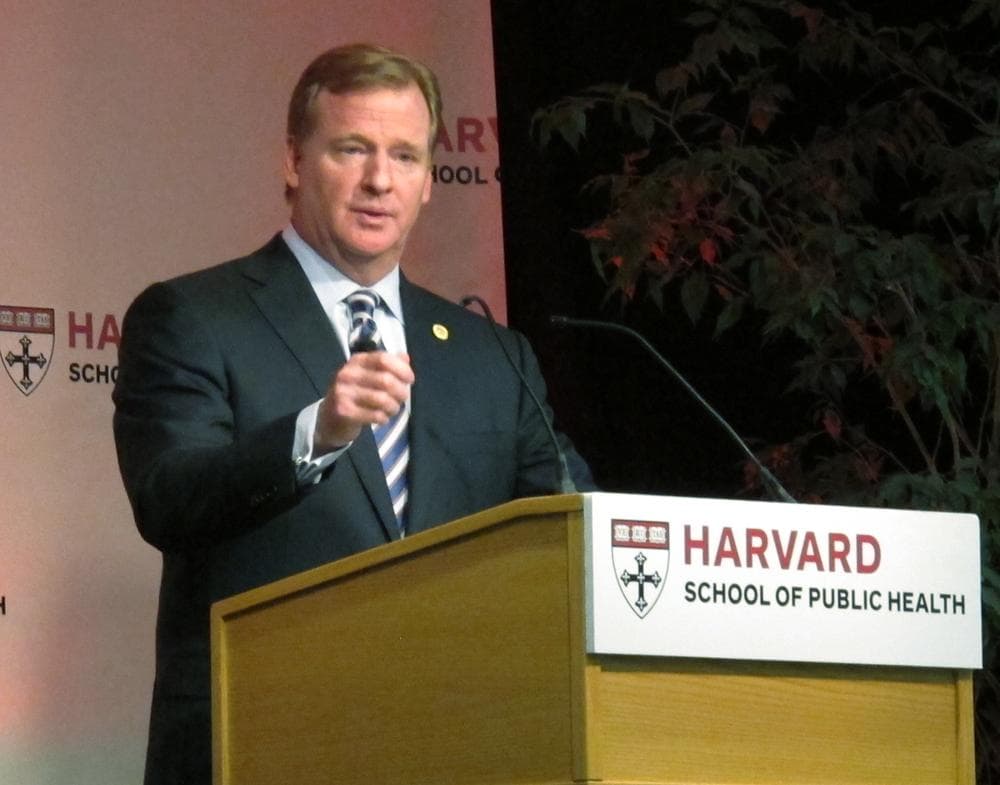Advertisement
In Depth
NFL's Goodell Addresses Concussions At Harvard
Resume
NFL Commissioner Roger Goodell was tapped for the Distinguished Dean's Lecture at Harvard School of Public Health because of the league's "longstanding and evolving commitment to making professional football safer." The critics paid attention. Even before Goodell's speech on Thursday, AP National Sports Columnist Jim Litke took exception with the "longstanding" nature of that claim.
“Longstanding is obviously a relative term to the NFL, that's one of the reasons why they're being sued by thousands of former players, because the players contend in lawsuits. The league knew more about the link between concussions and the violence that is NFL football and withheld that information for a long time.”
Goodell faced a room filled to the brim with Harvard students and faculty, a few of this country's leading concussion researchers and doctors, and a couple dozen very skeptical reporters. It wasn’t surprising to hear him begin by kissing up to the home team.
“The history of football is closely connected with the history of Harvard,” Goodell said. “Football has been played here with distinction since 1873.”
Since the sport's humble and very violent beginnings, Goodell told the crowd, the game has been getting "safer and safer." But, the commissioner cautioned against the fantasy that any sport will ever be 100-percent safe.
“The simple truth is that any physical activity comes with risk and reward. Head injuries occur in sports.”
Dr. Bill Meehan runs the Sports Concussion Clinic at Boston Children's Hospital, and he gave the commissioner high marks for that assessment.
“Everything we do in life has a risk of injury and as an athlete, as a patient, you have to weigh the benefits of that activity vs. the risks associated with it, so I thought actually that was a very insightful remark on his part,” Meehan said.
Goodell alluded to the millions of dollars the NFL has contributed to medical research in the areas of concussion and concussion prevention. As the co-director of BU's Center for the Study of Chronic Traumatic Encephalopathy, Dr. Robert Cantu's research benefits from some of those dollars. He used to be a critic of the NFL, but Dr. Cantu said he now feels Goodell is doing a good job.
“He is passionately trying to make football safer. I commend him tremendously for that.”
And, unlike some members of the news media, Cantu didn't scoff when Goodell said, “we are proud to be leaders in sports health and safety.”
Dr. Cantu felt the NFL took the initiative to deal with concussions.
“It was the NFL…that said in 2010 that if you're diagnosed with a concussion, you're out of that contest, and within months the NCAA said, that's a pretty good idea, and the [National Federation of State High School Associations] said ‘that's a fine idea’ and youth football said, ‘we'll adopt that, too.’ But it trickled down.”
Though Dr. Cantu was satisfied with Goodell's speech, during the Q&A, some of Harvard's students and faculty showed they weren't convinced.
The audience called out Goodell for his support for an 18 game regular season, moving more games to Thursdays, and for the fact that Alex Smith and Jay Cutler returned to play last Sunday after hits had left them concussed.
“What I think was progress about what happened this week, as unfortunate as it is when you have concussions, is that it was identified and they were taken out of the game,” Goodell said in response to the challenge. “Even a few years ago, I'm not sure that would have happened.”
But then there was the point Goodell made twice in his speech, again in the Q&A, and again in a short interview session with reporters.
“We need to be driven by facts and data, not perceptions and suppositions.”
The NFL has repeatedly used this line of reasoning to explain why the league didn't do more to protect players sooner. After a 39-minute address stressing the importance of player safety and all the questions that followed, it wasn’t surprising that at least one reporter thought Goodell might finally be willing to concede that football has the potential to cause long term brain damage.
“What we're doing is making sure that we're doing everything to make the game safer,” Goodell responded. “Those conclusions have to be drawn by the medical community.”
Maybe that's a point the NFL can't afford to concede right now, while facing lawsuits from somewhere between 3,000-4,000 former players. But, it's a question Goodell is likely to face, again and again, until he gives the answer people are waiting to hear.
This segment aired on November 17, 2012.
